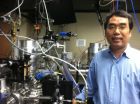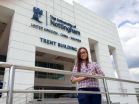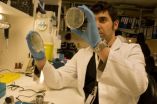(Press-News.org) University of Central Florida physicist Zenghu Chang has done it again. For a third time this year, his research group has published an article in a Nature journal.
This time, Chang and his team have developed a new ultrafast light source for observing electron motion in molecules – made up of nuclei and electrons – at the point before the nuclei start to move. By being able to observe what actually happens, scientists can begin to understand how an electron interacts with other electrons, which may help improve the efficiency of solar cells.
"The charge migration that theorists have been predicting since 1999 happens so quickly we haven't been able to observe it yet," Chang said. "It's very exciting, because we have found a new way to build light sources that may allow us to see it in the future."
Being able to see this superfast interaction between electrons gives scientists another tool to unlock the rules that govern the quantum-mechanics world – a world where microscopic objects don't obey the laws of physics we have come to rely on for understanding in the macro world.
So how did Chang and his team manage to develop the new light source? The team borrowed an idea from Chang's earlier innovative work in the area of ultrafast lasers.
"We control the below-threshold harmonic light emission by using electromagnetic fields with time-dependent ellipticity, like we have done to the above-threshold high-order harmonics," said Chang referring to the creation of a 67-attosecond pulse of extreme ultraviolet light, which earned him international recognition. "We thought: Could we use the same gating fields to show the dependence of the below-threshold harmonic intensity on the carrier-envelope phase of the driving laser? It took us some time to find the right experimental parameters, but the answer is yes."
The result of his study "Coherent phase-matched VUV generation by field-controlled bound states" appears this week in Nature Photonics.
Chang has been studying light and ultrafast lasers his entire career. This past year UCF established the Institute for the Frontier of Attosecond Science and Technology (FAST). The institute is a collaboration between experts and students in UCF's College of Optics and Photonics (CREOL) and the College of Sciences' physics department to focus on this field of science.
Co-authors include: Michael Chini, Xiaowei Wang, Yan Cheng, Yi Wu and Eric Cunningham from UCF's FAST; Peng-Cheng Li, John Heslar and Shih-I Chu from the Center for Quantum Science and Engineering and the Department of Physics at the National Taiwan University; He Wang from the Materials Sciences Division at the Lawrence Berkeley National Laboratory, and Dmitry A. Telnov from the Department of Physics at St. Petersburg State University in Russia.
"It was truly a collaborative effort," Chang said. "And there are certainly commercial applications. We're talking about cutting-edge lasers with potential application in electronics, navigation, communications and medicine."
Chang said he is excited about the new work because he hopes it will help lead to bigger and greater discoveries.
"My dream is to discover new physics that has not been predicted at this time," Chang said. "Until there was a microscope, we had no idea how complicated, how amazing cells were. What we are creating now are tools for magnifying time in order to discover what we have not even imagined yet. That's what I see for the future of our field."
INFORMATION:
The Defense Advanced Research Projects Agency, National Science Foundation, U.S. Department of Energy, National Science Council of Taiwan and National Taiwan University funded the research.
America's Partnership University: The University of Central Florida, the nation's second-largest university with nearly 60,000 students, has grown in size, quality, diversity and reputation in its first 50 years. Today, the university offers more than 200 degree programs at its main campus in Orlando and more than a dozen other locations. UCF is an economic engine attracting and supporting industries vital to the region's future while providing students with real-world experiences that help them succeed after graduation. For more information, visit http://today.ucf.edu.
Ultrafast laser technique developed to observe electron action
2014-05-13
ELSE PRESS RELEASES FROM THIS DATE:
Released prisoners are more likely to suffer early death
2014-05-13
Men who have been incarcerated and released are more than twice as likely to die prematurely as those who have not been imprisoned, according to a new study published by Georgia State University criminologist William Alex Pridemore.
Former prisoners are more likely to die early from infectious and respiratory diseases, drug overdoses and homicides. Causes of this "mortality penalty" include increased exposure to diseases like TB and HIV, the prolonged stress of the prison environment, the disruption of important social bonds and, upon release, the struggle to reintegrate ...
Forgiving a wrong may actually make it easier to forget
2014-05-13
We're often told to "forgive and forget" the wrongs that we suffer – it turns out that there may be some scientific truth behind the common saying. A study from researchers at the University of St. Andrews in Scotland shows that the details of a transgression are more susceptible to forgetting when that transgression has been forgiven.
The findings are published in Psychological Science, a journal of the Association for Psychological Science.
"It is well established that learning to forgive others can have positive benefits for an individual's physical and mental health," ...
Signal Fire in New Mexico
2014-05-13
Firefighters are currently battling the Signal Fire in the Gila National Forest in New Mexico. The fire was reported by the Signal Peak Lookout Tower Sunday (May 11) in the afternoon and is located approximately 15 miles north of Silver City. It is currently estimated to be 4,700 acres. The Southwest Area Incident Management Team assumed command of the fire Monday at 6:00 p.m. The cause of the fire is thought to be human either a careless camper or arson, but the investigation is still ongoing. Residents in the vicinity of Signal Peak have evacuated. The firefighters ...
Screening is 'not effective' in the fight against domestic violence
2014-05-13
One in three women around the world have experienced physical or sexual violence from a partner. Although domestic violence is associated with a range of adverse health impacts, even after the abuse has ended, it is not easily identified by health care professionals, prompting some countries, notably the United States, to introduce screening programmes in healthcare settings. A new study, published online by the BMJ today [13 May], has found no evidence to support domestic violence screening.
Researchers from the Universities of Bristol and Melbourne, La Trobe and Columbia ...
Surgery study shows worse health, more problems and higher costs among Medicaid patients
2014-05-13
ANN ARBOR, Mich. — Surgery patients covered by Medicaid come into their operations with worse health, do worse afterward, stay in the hospital longer and find themselves back in the hospital more often than those covered by private insurance, a new analysis by University of Michigan Medical School researchers finds.
In fact, people with Medicaid coverage were twice as likely as other patients to have certain health risk factors before they had surgery, the researchers report in JAMA Surgery. They also had many more emergency operations, experienced two-thirds more complications ...
New cancer immunotherapy aims powerful T cells against tumors
2014-05-13
Deadly skin cancers in mice shrank in response to a new treatment that may complement other "immunotherapies" developed recently to boost the body's own defenses against disease threats, according to a new study published by UC San Francisco researchers in the May 2014 edition of the Journal of Experimental Medicine.
Using a mouse version of a human drug that is popular for treating osteoporosis, the UCSF researchers discovered a way to manipulate the thymus, a gland situated at the base of the neck above the heart, to alter its activity so that some of the specialized ...
First year student publishes monsoon study
2014-05-13
A first year Environmental Science student at The University of Nottingham Malaysia Campus (UNMC) has had a literature review of the Southeast Asian monsoon published in the academic journal Geoscience Frontiers. Her research concluded that future climate warming could lead to a 15 day delay in the monsoon onset in Southeast Asia by the start of the next century.
Yen Yi Loo investigated how global and regional temperature and rainfall anomalies affect rainfall patterns and the South East Asian Monsoon. She also highlighted how increased rainfall intensity in the last ...
New agent may enhance effectiveness of radiotherapy
2014-05-13
Scientists from The University of Manchester – part of the Manchester Cancer Research Centre - have demonstrated the potential of a drug to improve the effectiveness of radiotherapy in stopping tumour growth.
There is increasing interest in using the body's own immune system to attack tumour cells – a strategy that can be very effective without the side effects associated with conventional chemotherapy.
Skin cancers have been successfully treated using a topical cream, imiquimod, which recruits immune cells through a molecule known as toll-like receptor 7 (TLR7), a ...
Arthroscopy of the knee joint for arthrosis: No benefit detectable
2014-05-13
The benefit of therapeutic arthroscopy with lavage and possible debridement for the treatment of arthrosis of the knee joint (gonarthrosis) is not proven. There was no hint, indication or proof of benefit of therapeutic arthroscopy in comparison with non-active comparator interventions, e.g. sham surgery, for any patient-relevant outcome. From the active comparator therapies, only the injection of glucocorticoids into the knee joint produced worse results than arthroscopy for the outcome "global assessment of the symptoms of gonarthrosis".
This was the result of the ...
Identified 2 new genes involved in the more aggressive prostate cancer
2014-05-13
A study by the Columbia University Nova York, in collaboration with the Catalan Institute of Oncology , Belvitge Biomedical Research Institute (ICO-IDIBELL) has identified two new genes that lead to more aggressive forms of prostate cancer. The work done by Alvaro Aytes under the direction of Cory Abate-Shen , director of the Herbert Irving Comprehensive Cancer Center of the Columbia University, has been published in the latest issue of Cancer Cell.
Prostate cancer
Prostate cancer is the most common in men in Europe( accounts for 20% of all male tumors). The incidence ...



